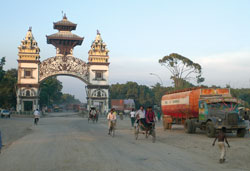|
|
Madhesi leaders share a strange relationship-they fight amongst themselves and fragment, yet co-operate on issues. Mainstream or armed, national or local, they are all in touch with each other. Local factors are more important than pan-Madhes issues in many cases. No alliance is static. The line between politics and crime is blurred, and caste remains the central determinant in political choices.
Not a single madhesi moderate force is now committed to the electoral process. Upendra Yadav found an excuse after the postponement of polls to walk out from his deal. The NSP-Mahato has announced an agitation after the EC and SC refused to recognise it as the legitimate NSP. Both these groups are vulnerable to Indian pressure and a NC-MJF-NSP alliance is still possible. But their present move has complicated politics and reflects something deeper: any estrangement with Kathmandu opens up the space to question the legitimacy of the entire political system.
Rajendra Mahato and his aides suspect that the prime minister instructed the CEC not to award his faction the original party status, with the motive of weakening the madhesi forces. They are thinking of beginning a movement demanding a commitment to a regional parliament and regional prime minister in the tarai before the CA polls.
The madhesi armed groups are thrilled. Apart from the king and army, if the poll postponement benefits anyone, it is them. And with above-ground parties revising their strategy, the rebels have the upper hand. Both Goit and Jwala Singh have assured the parties of behind-the-scenes support in case they decide to go ahead with any agitation. Their problem is that all of them have a severe resource crunch.
Underground politics is evolving as rapidly. The most recent split in the Goit faction was led by Pawan aka Prahlad Giri, a Parsa leader who was with the UML and then turned royalist. Some local Raxaul leaders encouraged this split because they were disappointed with Goit's uncompromising stance on secession as well as building a united front with other madhesi forces. They would like to see an alliance between Pawan, Jwala, and the MJF dissident faction. Jwala Singh has been steadily increasing his numbers and has managed to avert splits by giving his district units a high degree of autonomy as long as it shares the loot with the central leader.
But while both Goit and Jwala hate each other, their district level units have been co-operating in planning joint political action and even extortion. There is constant communication between their district leaders along with those of both factions of MJF.
Caste remains central to underground and mainstream politics. The MJF split had more to do with the Yadav non-Yadav divide than policy differences. A dissident leader says, "Those who stayed with Upendra are Yadavs and the rest came with us. That is natural." The divide has become stark on the ground. A Biswas faction activist in Birganj pulled this writer away from a local journalist, saying he was a Yadav and would provide misleading information.
But this does not mean all Yadavs get along. Upendra and Goit share an acrimonious relationship because both are Yadavs from adjacent districts and know only one can make it big. Instead, Upendra and Jwala shared a closer relationship, at least until the MJF leader signed the deal.
Jwala is a dalit, and wants to engineer a dalit-brahman alliance in the Mayawati style. His district commanders are mostly upper caste but his understanding and commitment to such an alliance and whether it is feasible in the Tarai's context is questionable. Madhesi brahmans are happy with the movement but are not keen on greater democratisation within because of their limited population share. Most dalits know that madhesi high castes remain their primary oppressors. At the same time though, they do identify themselves as madhesi dalits rather than seeking a new independent identity.
In this almost incomprehensible madhes maze, the only certainty is there will be more confusion and disorder. Polarisation will continue and alliances will emerge and collapse.




